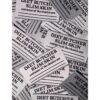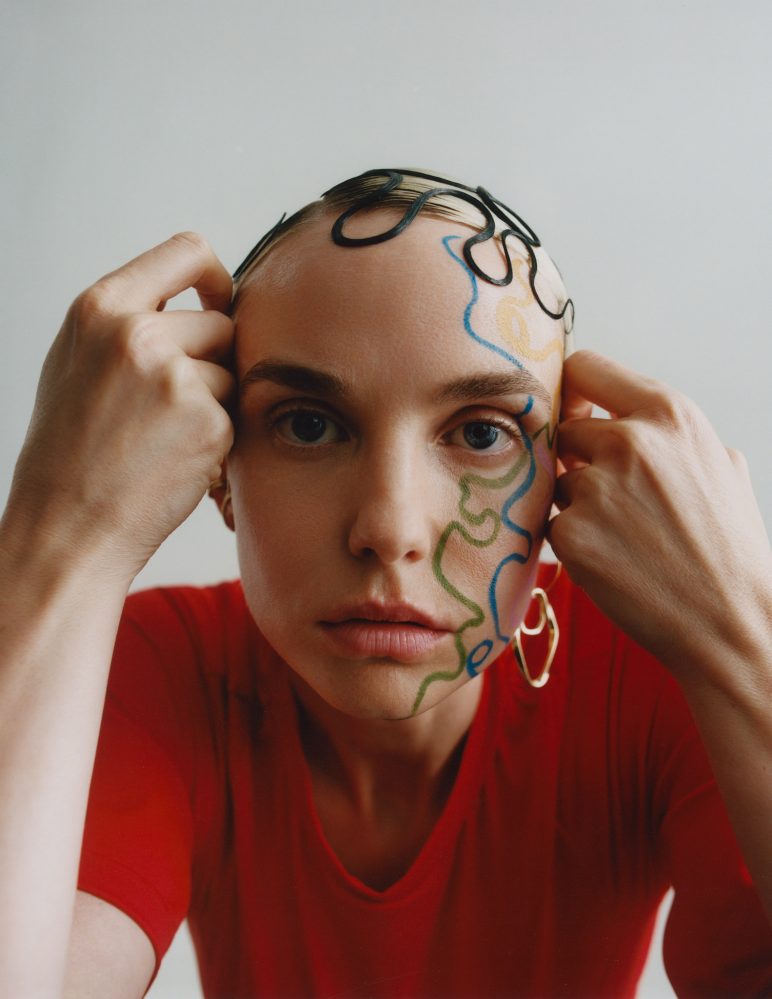
Rewrite
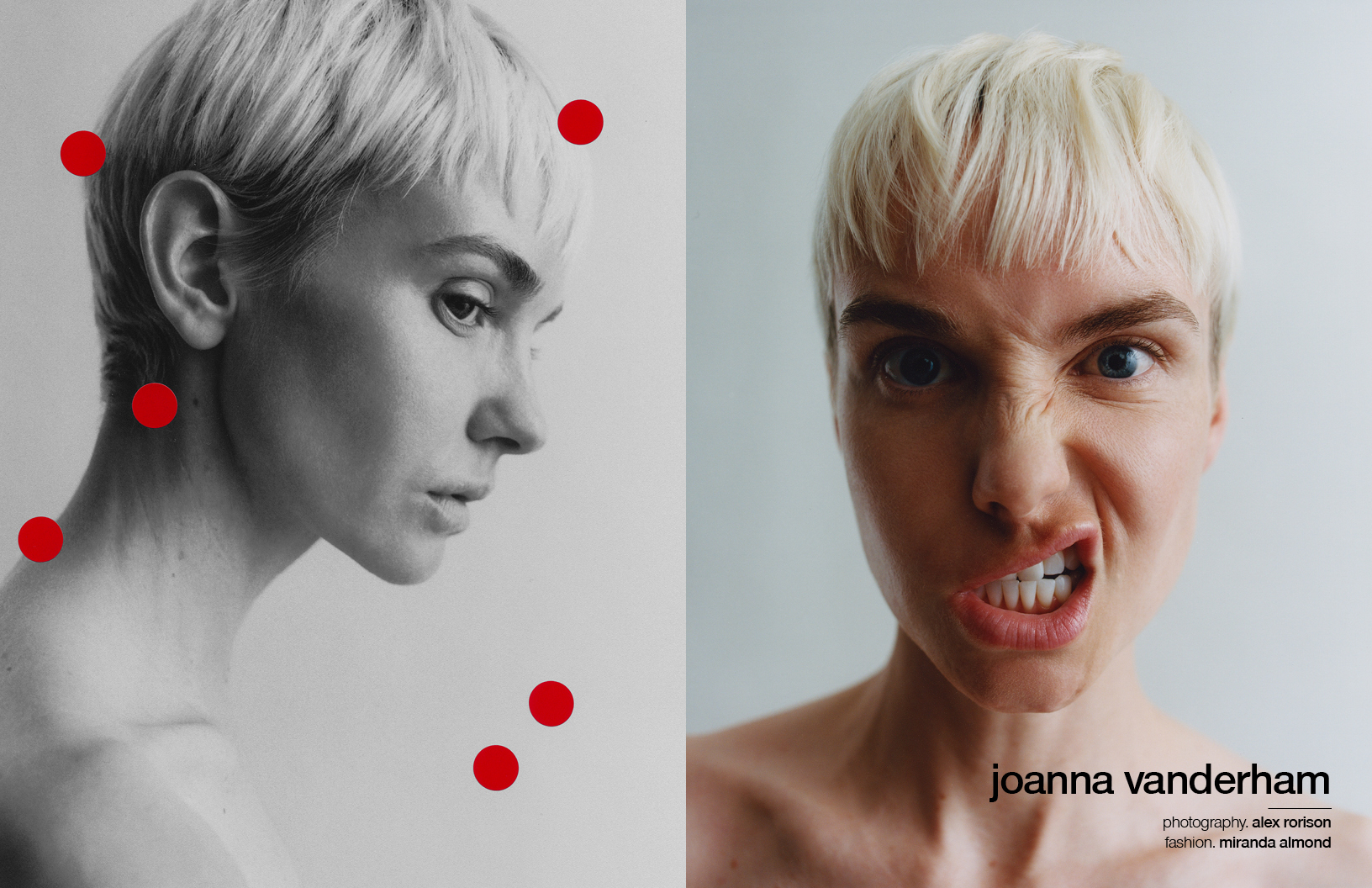
Joanna wears
top. Magda Butrym
opposite
Joanna wears
top. Magda Butrym
Some actors play a role. Joanna Vanderham lives with hers — sometimes longer than she plans to. Whether stepping into the fragile yet unbreakable Blanche Du Bois on stage or portraying the elusive Diana Mitford in ‘Outrageous’, Vanderham brings a truth so palpable it can follow her home, slip into her dreams, and linger in her bones.
She speaks openly about coming home in tears with feelings that aren’t her own, cutting her hair as a kind of post-performance exorcism, or waking in the night still spinning from a scene staged hours earlier. For her, the work isn’t just memorizing lines — it’s uncovering the emotional architecture of a person and then letting that structure temporarily replace her own.
In conversation with Schön!, Vanderham talks about Diana’s intoxicating ambition, finding the human inside “the bad guy,” and more.
When you first sat down with the script of Outrageous, what was your instinctive reaction? How did you feel meeting Diana Mitford on the page for the first time?
I think when I first got the script, I was really struck by the pace. Some period dramas feel a little bit soporific, which is not a bad thing. People want escapism. They want to step into another time and forget their own worries. But this script moved fast. There are six sisters, and so much story to get through, it just moves at a real rate.
I was excited about stepping into a period drama that felt surprisingly modern. Not just because of the writing, but also because of the theme. It felt terrifyingly relevant. The story explores how someone can turn into an extremist and how they become radicalised. It felt like a story I really needed to tell.
I think that is one of the very few things you have control over as an actor, your choice of what projects you say yes or no to. So when I think about my work and what I want to spend my time on, I always ask myself if this is a story I want to tell. This one felt like it was. It felt like audiences needed to see it. I hope it is reaching a really wide audience because it moves at such a pace and feels modern. People who love period dramas will already love it, but I think people who prefer a more modern style of show will be drawn to it too.
I did not really know anything about Diana Mosley. I did not know anything about the Mitfords. I was new to the whole thing. So when I started reading, I wondered how someone who seems to have it all could feel so frustrated. At that time, she had a very rich husband, did not have to work, had two children, and ticked all the boxes. Yet she felt confined by that. I wanted to show a woman on screen who was not necessarily happy surviving within the status quo.
All the sisters, in their own ways, were trying to make a change. Some of them, in ways we would not agree with now, with hindsight, but they all wanted to be in the thick of it. They wanted to be with the decision makers and influence the world they lived in. When you play someone like Diana, who is essentially the bad guy, you have to find the bits of the character you relate to. That was something I connected with.
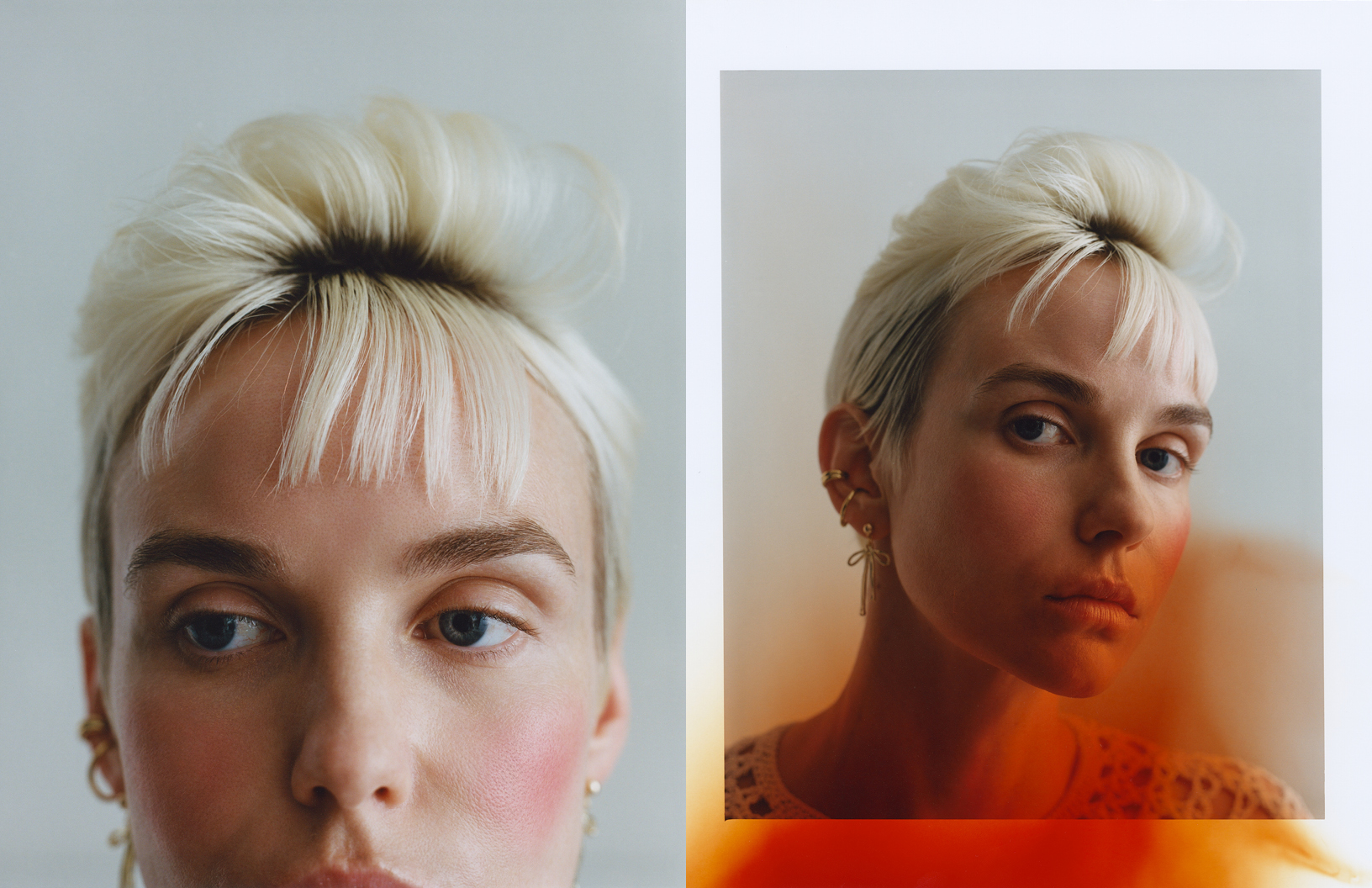
Joanna wears
earrings. ALOË EARRINGS
opposite
Joanna wears
top. Onateri
earrings. ALOË EARRINGS
Did you ever have a moment on set, maybe even an unexpected one, when you felt you truly understood Diana in a way you had not before?
You know, it is interesting because I still feel like she is such an enigma. I spent months playing her and researching everything I could about her, and I still do not think I understand how her mind works. It would be easy to say she fell in love with Mosley, and that is it. She did it for love. But I do not think it is that simple.
I think she set the ball rolling for all her sisters to break the mould and step outside of what was expected of women in that social class and era. What was really fun to play, and maybe she would never have said this herself, was how ambitious she was. I think she wanted power, influence, and control for herself. She was attracted to Mosley, yes, but she was incredibly stubborn.
She said she was going to marry him even though he was still married. Then, when his wife died, and he still did not want to marry her, she forced it through. She had that streak of when I set myself on a path, it would happen.
That is a fascinating character to play. But she was very difficult to relate to. In all the research I did, she was not particularly forthcoming. She did not really say what she thought about any given circumstance.
I think that is a very British thing of the time. I am Scottish, so maybe I have an outsider’s insight into English. I feel like I can see them with more objectivity than they see themselves. It is such an English thing to bottle up emotions and keep that stiff upper lip. She was the epitome of that.
In her memoir, she skips over the fact that she got divorced. One day she talks about having dinner with Bryan and some friends, and the next chapter, it is dinner with Mosley and his friends. She does not even mention it, let alone how she felt.
That is where Sarah Williams, our writer, came in. She filled in some of the blanks and really put her stamp on it. As actors, we had quite free rein, based on all the research we had done. We were trusted on set, which created an amazing atmosphere. It was a very collaborative project. If we read something that made us think we should play a scene a certain way, the director would listen.
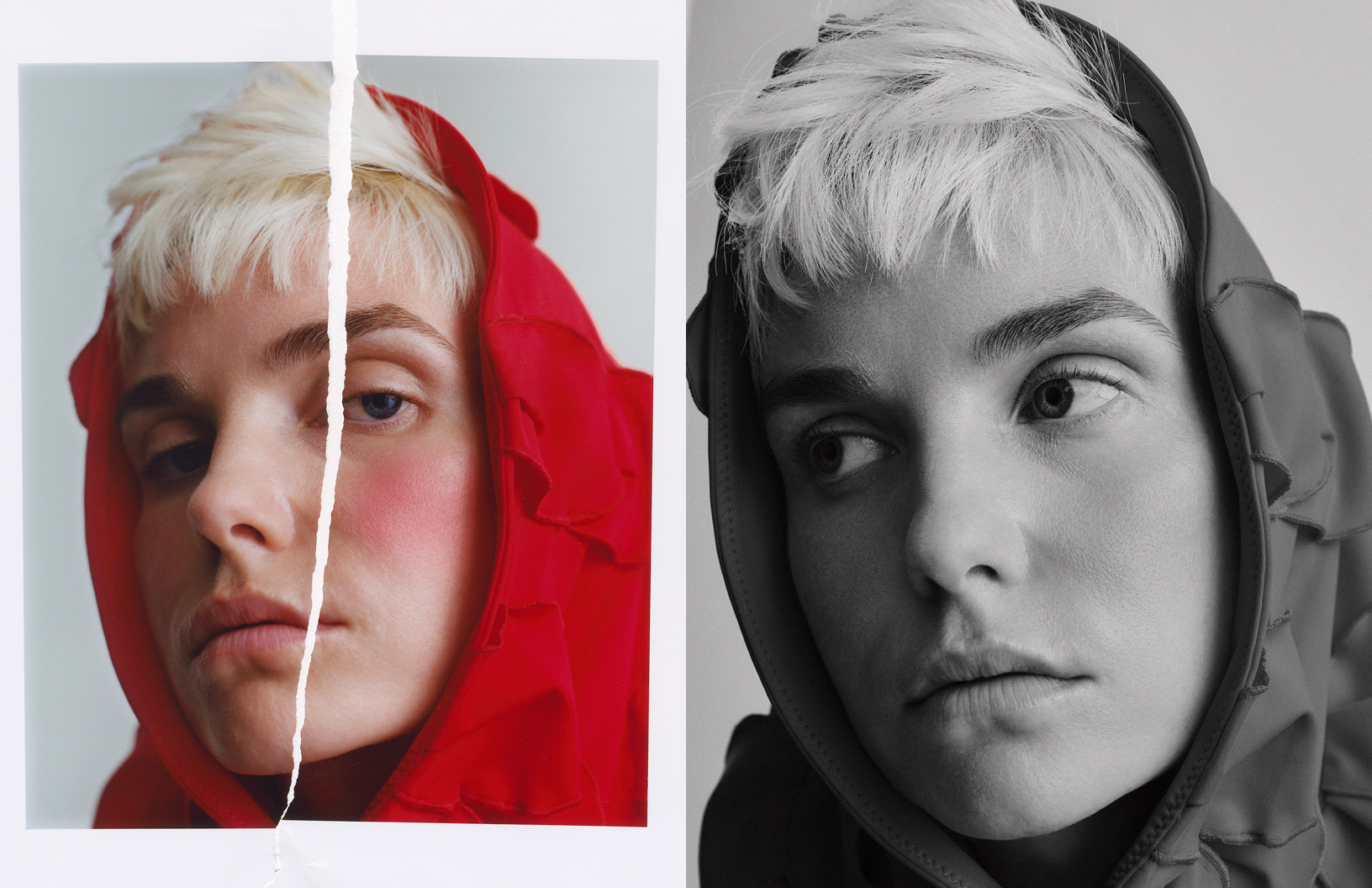
Joanna wears
red top worn as head scarf. Samanta Virginio
opposite
Joanna wears
red top worn as head scarf. Samanta Virginio
It must have been exciting to be part of UKTV’s first original drama. Did that bring a special energy or sense of responsibility to the project for you?
Well, that is an interesting question. I am not sure I necessarily thought about it much. It was not really until we started doing the publicity and the press that UKTV became much more of a presence. I think that says a lot about them actually because it means they put together a team they trusted and then let us get on with it.
There was no micromanaging, no calls saying the network wanted things done a certain way. None of that. Every now and then, one of the producers, Matthew, would mention that everyone at UKTV was really enjoying the footage. So we knew they were involved and watching, but they stayed quite hands-off. Especially since this was their first original show. They put a creative team together and trusted them to deliver.
That set the tone for the whole production. You were hired and trusted to be able to deliver. Honestly, I know this might sound a bit cheesy, but it was just such a dreamy job. We are really hoping for season two. Not only did all the creatives get on really well and I feel like we made something special, but all the sisters and the whole cast want the chance to spend more time together again.
It was just the most amazing summer. There were days when we were filming at a gorgeous country house in England, drinking fake champagne and sitting on the lawn thinking, this is our life. This is so fun. So yes, we really hope we get to do it again.
I was not expecting that actually. When I heard about UKTV, I thought it would be more strict. But it sounds quite autonomous.
Why did you think they would be strict? That is interesting.
I think it is because I am from Turkey. The media here is really strict with so many rules. I thought it would be the same kind of thing. But the way you said it makes it sound really fun. And also, true in a way. They trust you.
Yes, exactly. I think creative people think differently. If you micromanage them, it can actually be really problematic.
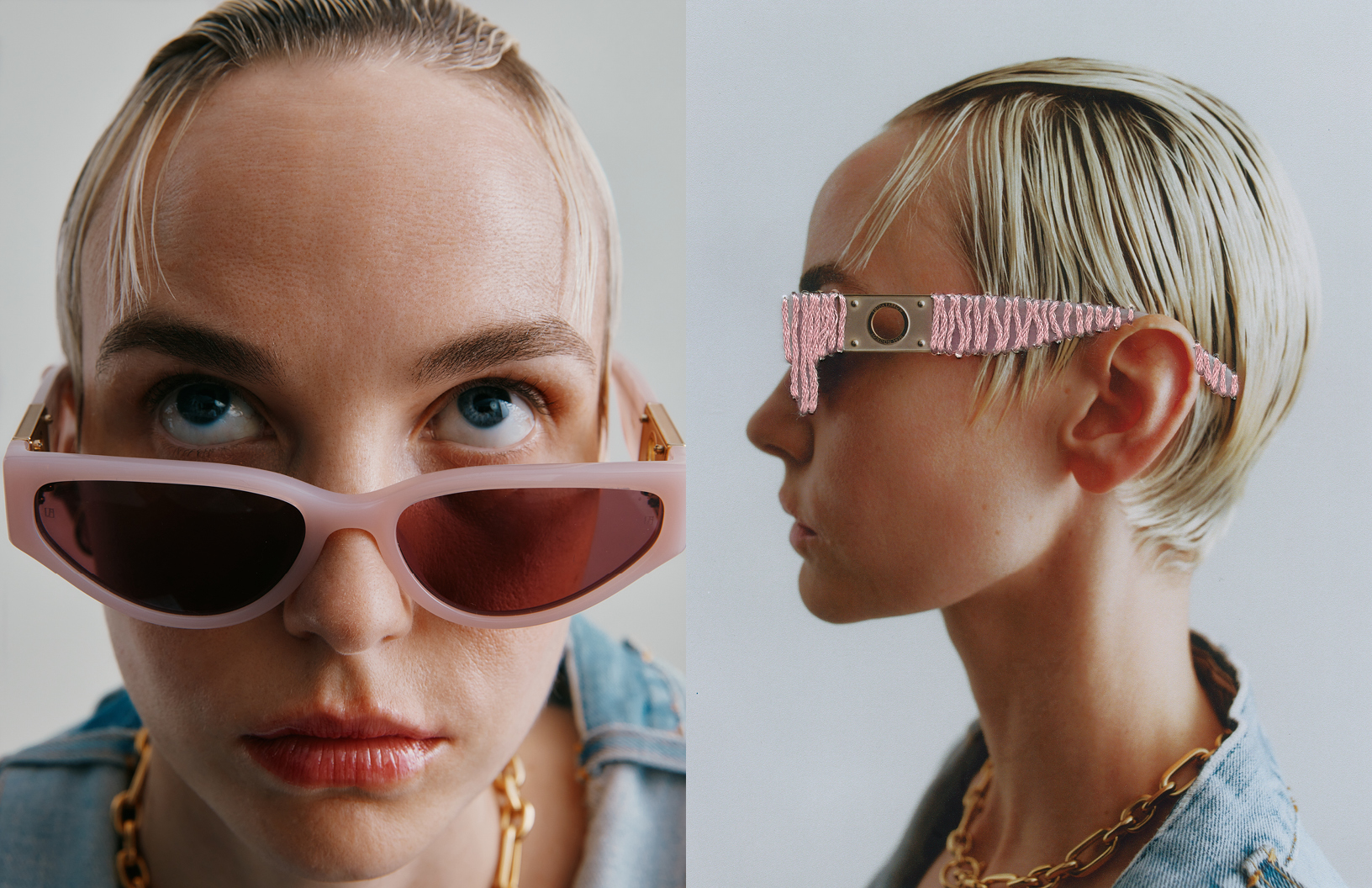
Joanna wears
jacket. Critter
sunglasses. Linda Farrow
necklace. Tilly Sveaas
I also wonder, when critics describe your work as dazzling or magnetic, words that get thrown around a lot, how do you actually process that? Does it land with you or do you tend to tune it out?
I do not read reviews. I learned the hard way. I think it was when I was playing Desdemona in Othello about ten years ago. I decided to read all the reviews. The professional critics were pretty nice, but then there was some random person with a blog who was really mean. I just thought, why did I do this? It is so true what they say. You can have twenty people say nice things and one person say something nasty, and that is the one you remember.
So I stopped reading them completely. I do not do this job to hear what critics or reviewers think. If you put too much weight on that, I think it would drive you mad. You would not be able to stick it out as an actor in this industry if that was why you were doing it. Of course, it feels good when people respond to your work. But for me, the most important thing is whether I have told the story I wanted to tell. So much of Outrageous is in the subtext. It is all about what is going on between the lines and what is not said.
When that unspoken conversation lands with an audience, that is why I do this. The most interesting part of the job is when someone says, you did not even have any lines in that scene, but I knew exactly how you felt, or I have been in that situation and I was speechless too.
Those moments when you feel like a real person to the audience, that is thrilling for me. And I have to admit, it is a delayed process because we filmed this last year. So when critics or anyone else talk about a specific scene, I sometimes do not even really remember filming it.
Theatre is much more immediate. In that moment, it feels worth it. What matters to me is what the audience walks away feeling.
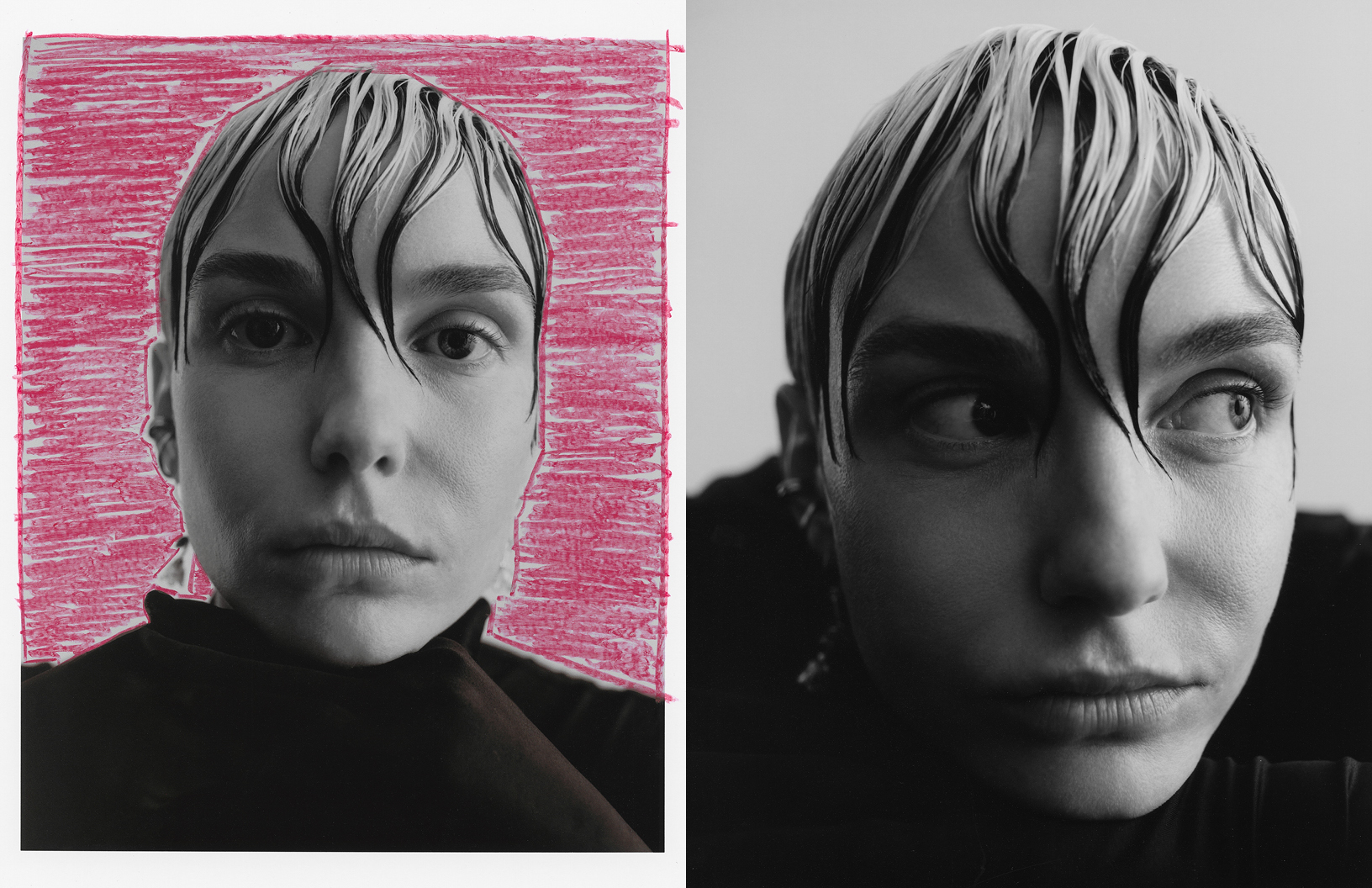
Joanna wears
top. Critter
ear cuff. Otiumberg
opposite
Joanna wears
top. Critter
ear cuff. Otiumberg
That is great to hear. And thinking back on all the women you have played so far, is there one who still lingers with you in ways you perhaps never saw coming?
Thank you. I feel like when you play a character, what it really demands of you is allowing a certain side of your own personality to come to the fore more than any other parts of you. Sometimes I will be working on a project, and it is not like I am staying in character on purpose, but I seem to access parts of my personality more quickly. I think when I am playing a part, I generally end up being a bit more like that person.
I really feel for my partner because he has to deal with that. I remember once when I was doing a TV show. I came home, and Ben was there, and I just could not stop crying. He kept asking what was wrong. And I remember saying, with tears running down my face, these are not my emotions. These are not my feelings. That must feel like living with someone who has no control over their emotional state. It must be a challenge for him. But now he has learned.
Sometimes I will come home feeling really sad, and he will ask me, are these yours? Are these your feelings? He will check in. More often than not, I say no, this is not me.
I keep saying this, I really need to get better at leaving it behind. When I played Blanche Du Bois in A Streetcar Named Desire earlier this year, I would come home from rehearsals or during tech rehearsals and have nightmares. Nightmares that my loved ones were committing suicide, that I was being attacked, and it would all be happening on a spinning stage. I even had nightmares where I was spinning, because that is when the assault scene happens in the play. I would have to put my foot on the floor by my bed and remind myself I was stationary. It would take me a minute in the middle of the night to realise I was not spinning.
I had been warned about this. There is an incredible book called Blanche, all about the most iconic actresses who have played her. They all said she gets under your skin in ways you might not be prepared for. I thought I would be able to keep a lid on it because I knew it was coming, but it still got me. It got into my brain. It affected me so much that when I finished the play, I cut all my hair off, which was arguably a trauma response. So I think Blanche is probably the one that stayed with me the most. But maybe that is also because it was the most recent.
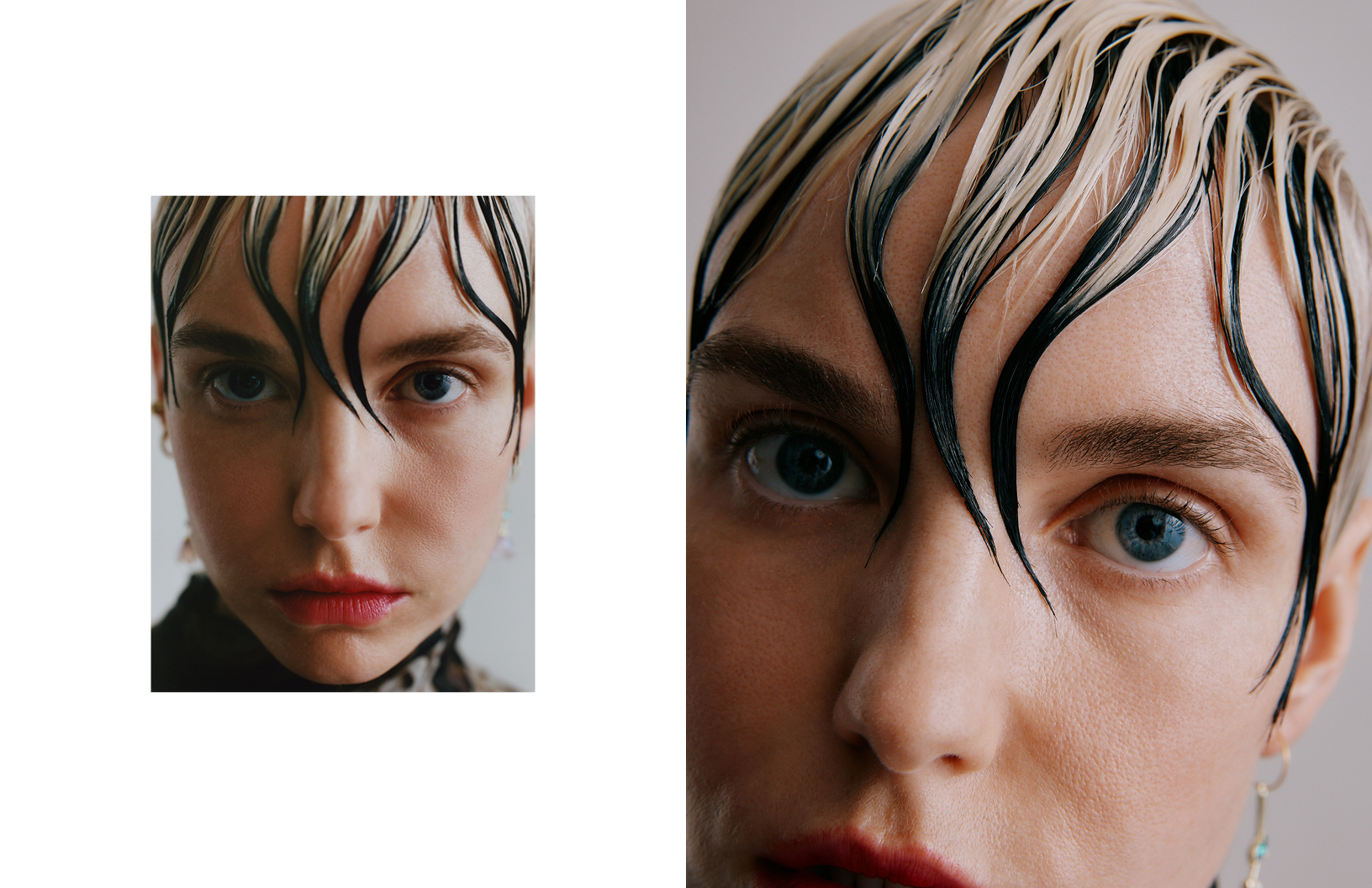
Joanna wears
top. Critter
ear cuff. Otiumberg
opposite
Joanna wears
top. Critter
ear cuff. Otiumberg
I was going to ask about Blanche. I saw so many reviews about that role. She seems like the big one. After stepping into her shoes on stage, what stayed with you once the curtain came down, both as an actor and a person?
The only thing I would add is that after playing Blanche, I feel like I can do anything. She is an iconic role for a reason. She challenges you. It is like a male actor getting to play Hamlet. It is one of the most demanding female roles in the canon. Now I think, what have you got? I can do it. I can do anything. To take that away from a project is something I feel very grateful for. Even though it was incredibly challenging and affected my mental health for a bit, I feel like I gained more than I lost.
I saw the first look you shared on Instagram. She looked really powerful, but also fragile at the same time.
That is exactly it. It feels like she is made of glass. She is forged in this tumultuous time, at the end of the plantation era in the American South. She is shaped into this feminine ideal of what it means to be a woman. That is her internalised misogyny. As she moves through life, she gets these chips and hairline fractures that stay with her because she is so rigid in her thinking.
The only way she can escape that is through fantasy, which makes her incredibly childlike. By the end of the play, this delicate piece of glass has been through so much that it shatters. She is left in pieces. I tried to work with that concept during rehearsals. Hopefully, it came across to the audience on stage.
But the thing about the play is that there is no catharsis for her. She is just left in pieces. The biggest challenge was figuring out how, as an actor, you put yourself back together every night, sometimes twice a day, so you can do it all over again. It was incredibly demanding, but I am really proud of myself for having done it.
Do you find that stage, film, and television each unlock different sides of you as a performer? Or is your approach rooted in something that transcends the medium?
I think I always approach everything from a place of truth. What is my actual truth? The characters do not have to be telling the truth, but I have to know what my truth is. Then it is a case of scaling that up or down for the performance — stage or screen — but it always has to come from a truthful place.
If you hold on to that, you do not have to think too much about the difference between acting on stage or for the camera. They are incredibly different in practical terms. On set, you film scenes out of sequence, so you have to remind yourself where you have been emotionally, what conversations you have just had, even if you have not filmed them yet or filmed them a month ago. You walk onto set knowing you have to bring that energy, film for three minutes, then wait half an hour while they move cameras, then come back and do it again.
It is a different demand. On stage, you are fully responsible for taking the audience on that journey. Once you step on stage, you cannot go again. You do not get a second take. You have to stay completely present. It is actually very meditative. If you start thinking about anything else — like realising you just fluffed a line while still speaking — you risk losing your place or missing your cue. You have to stay incredibly focused for three hours.
On set, you need three minutes of intense focus at a time, but the challenge is not wasting your energy on anything else in between because you will need it when you shoot again. They are wildly different, but I enjoy both. I love that my career has given me the chance to do both.
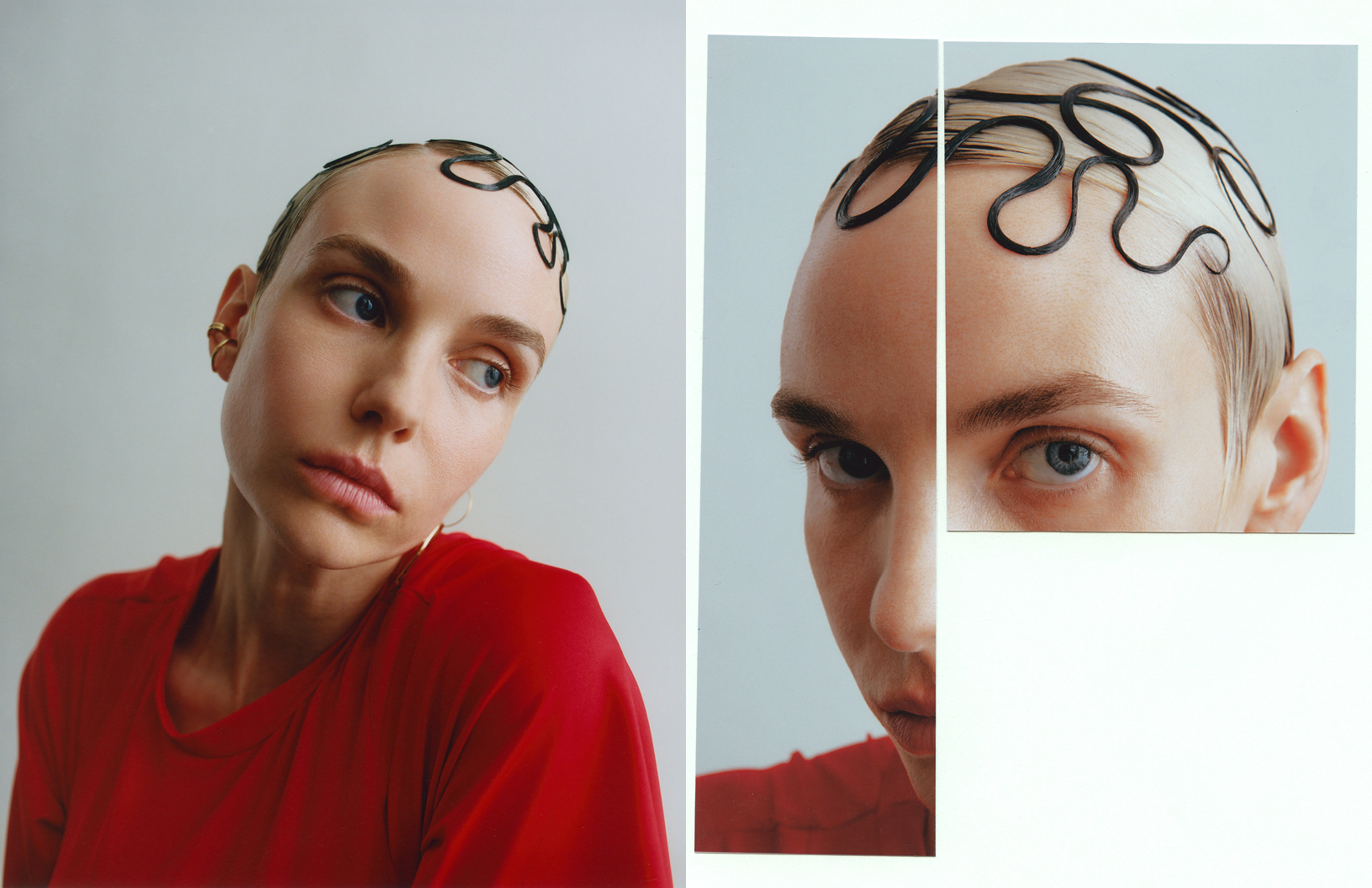
Joanna wears
top. Critter
ear cuff. Otiumberg
earring. ALOË EARRINGS
opposite
Joanna wears
top. Critter
ear cuff. Otiumberg
earring. ALOË EARRINGS
You have worked with some remarkable actors and directors. Is there a piece of advice or a moment from those collaborations that really stayed with you?
Something that definitely stayed with me is what Julianne Moore said when we worked together. She was not even trying to give me advice. She was incredibly respectful, considering it was only my third job ever and my first film. She treated me like an equal. She casually said, always bring a solution. Do not just show up with a problem.
That has really stayed with me. If she thought a scene or some lines needed reworking, she would suggest something. She would say, what if we do it this way? Or have you thought of this? She would come with an idea instead of just saying she did not like something. She could have said that, and I am sure some actors do, but I have lived by that as a rule. Never turn up with a problem. Always bring a solution.
Of course, acting is subjective. What works for one actor may not work for another. Ralph Fiennes once gave me advice that Dougray Scott would probably completely disagree with. You have to be your own person. It is also not really the done thing to comment on someone else’s acting unless they ask you. Especially if you are on a similar experience level or standing in the industry. It is just not appropriate. It would be really awkward.
Looking ahead, are there certain kinds of stories or characters you feel particularly drawn to, maybe even ones that would surprise people?
Yes. I have been learning a lot of stunt work. I even went on a course. I am going to show you my certificate. I got certified in firearms handling and tactical rifle training for film and television. I now have my level one achievement, which means I can handle firearms on screen. I loved it. I would love to do more stunts. I have been learning to horse ride as well, so I feel like that has to come into play somehow. Maybe I should play some kind of spy. I feel like with this hair, I could put on a long wig and play a completely different character. Then halfway through, she could reveal who she really is. That would be great. Something where I can show off all my new stunt skills.
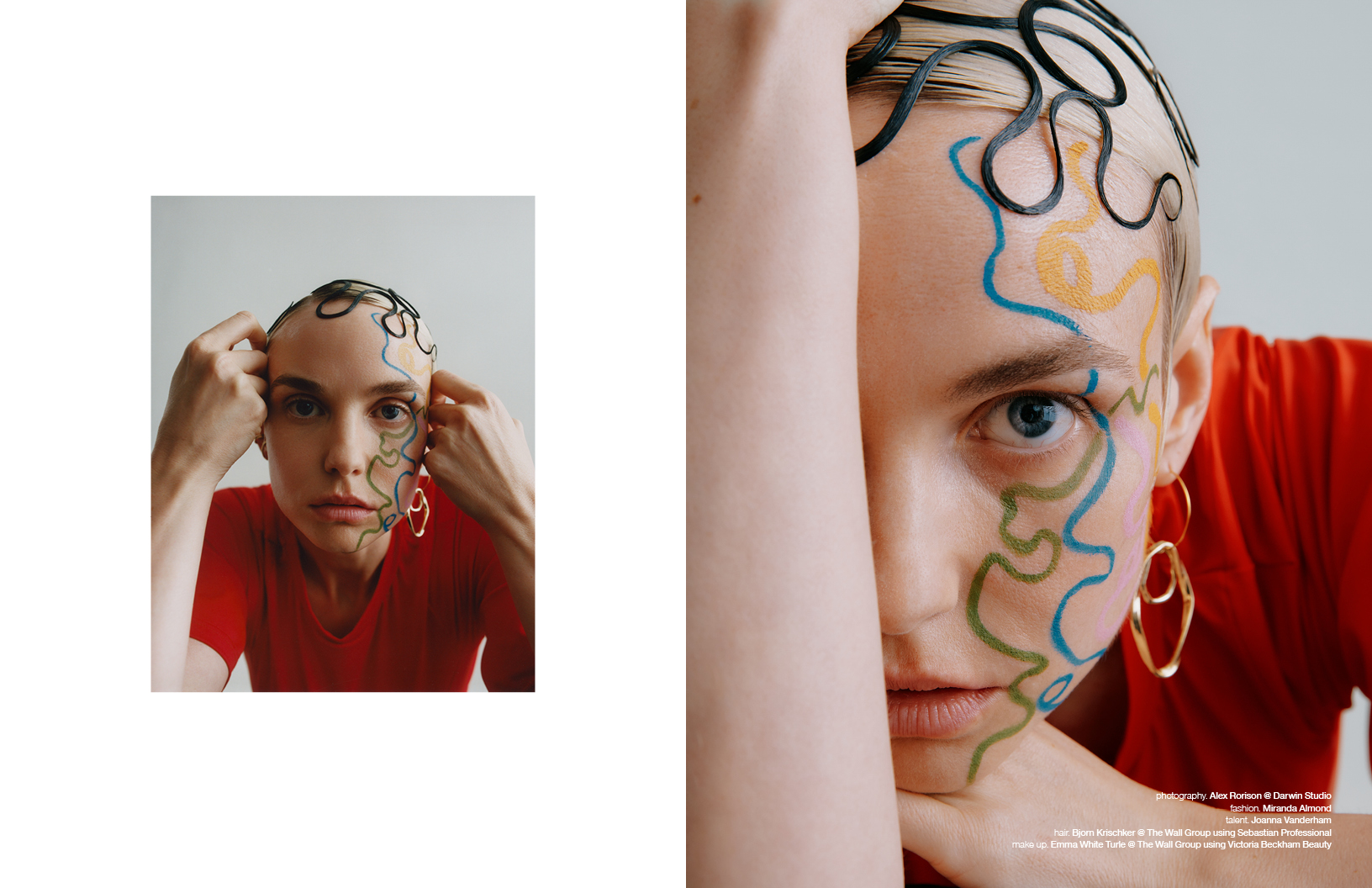
Joanna wears
top. Critter
ear cuff. Otiumberg
earring. ALOË EARRINGS
opposite
Joanna wears
top. Critter
ear cuff. Otiumberg
earring. ALOË EARRINGS
All episodes of Outrageous are available on BritBox.
photography. Alex Rorison @ Darwin Studio
fashion. Miranda Almond
talent. Joanna Vanderham
hair. Bjorn Krischker @ The Wall Group using Sebastian Professional
make up. Emma White Turle @ The Wall Group using Victoria Beckham Beauty
interview. Alper Kurtel
in HTML format, including tags, to make it appealing and easy to read for Japanese-speaking readers aged 20 to 40 interested in fashion. Organize the content with appropriate headings and subheadings (h1, h2, h3, h4, h5, h6), translating all text, including headings, into Japanese. Retain any existing
tags from

Joanna wears
top. Magda Butrym
opposite
Joanna wears
top. Magda Butrym
Some actors play a role. Joanna Vanderham lives with hers — sometimes longer than she plans to. Whether stepping into the fragile yet unbreakable Blanche Du Bois on stage or portraying the elusive Diana Mitford in ‘Outrageous’, Vanderham brings a truth so palpable it can follow her home, slip into her dreams, and linger in her bones.
She speaks openly about coming home in tears with feelings that aren’t her own, cutting her hair as a kind of post-performance exorcism, or waking in the night still spinning from a scene staged hours earlier. For her, the work isn’t just memorizing lines — it’s uncovering the emotional architecture of a person and then letting that structure temporarily replace her own.
In conversation with Schön!, Vanderham talks about Diana’s intoxicating ambition, finding the human inside “the bad guy,” and more.
When you first sat down with the script of Outrageous, what was your instinctive reaction? How did you feel meeting Diana Mitford on the page for the first time?
I think when I first got the script, I was really struck by the pace. Some period dramas feel a little bit soporific, which is not a bad thing. People want escapism. They want to step into another time and forget their own worries. But this script moved fast. There are six sisters, and so much story to get through, it just moves at a real rate.
I was excited about stepping into a period drama that felt surprisingly modern. Not just because of the writing, but also because of the theme. It felt terrifyingly relevant. The story explores how someone can turn into an extremist and how they become radicalised. It felt like a story I really needed to tell.
I think that is one of the very few things you have control over as an actor, your choice of what projects you say yes or no to. So when I think about my work and what I want to spend my time on, I always ask myself if this is a story I want to tell. This one felt like it was. It felt like audiences needed to see it. I hope it is reaching a really wide audience because it moves at such a pace and feels modern. People who love period dramas will already love it, but I think people who prefer a more modern style of show will be drawn to it too.
I did not really know anything about Diana Mosley. I did not know anything about the Mitfords. I was new to the whole thing. So when I started reading, I wondered how someone who seems to have it all could feel so frustrated. At that time, she had a very rich husband, did not have to work, had two children, and ticked all the boxes. Yet she felt confined by that. I wanted to show a woman on screen who was not necessarily happy surviving within the status quo.
All the sisters, in their own ways, were trying to make a change. Some of them, in ways we would not agree with now, with hindsight, but they all wanted to be in the thick of it. They wanted to be with the decision makers and influence the world they lived in. When you play someone like Diana, who is essentially the bad guy, you have to find the bits of the character you relate to. That was something I connected with.

Joanna wears
earrings. ALOË EARRINGS
opposite
Joanna wears
top. Onateri
earrings. ALOË EARRINGS
Did you ever have a moment on set, maybe even an unexpected one, when you felt you truly understood Diana in a way you had not before?
You know, it is interesting because I still feel like she is such an enigma. I spent months playing her and researching everything I could about her, and I still do not think I understand how her mind works. It would be easy to say she fell in love with Mosley, and that is it. She did it for love. But I do not think it is that simple.
I think she set the ball rolling for all her sisters to break the mould and step outside of what was expected of women in that social class and era. What was really fun to play, and maybe she would never have said this herself, was how ambitious she was. I think she wanted power, influence, and control for herself. She was attracted to Mosley, yes, but she was incredibly stubborn.
She said she was going to marry him even though he was still married. Then, when his wife died, and he still did not want to marry her, she forced it through. She had that streak of when I set myself on a path, it would happen.
That is a fascinating character to play. But she was very difficult to relate to. In all the research I did, she was not particularly forthcoming. She did not really say what she thought about any given circumstance.
I think that is a very British thing of the time. I am Scottish, so maybe I have an outsider’s insight into English. I feel like I can see them with more objectivity than they see themselves. It is such an English thing to bottle up emotions and keep that stiff upper lip. She was the epitome of that.
In her memoir, she skips over the fact that she got divorced. One day she talks about having dinner with Bryan and some friends, and the next chapter, it is dinner with Mosley and his friends. She does not even mention it, let alone how she felt.
That is where Sarah Williams, our writer, came in. She filled in some of the blanks and really put her stamp on it. As actors, we had quite free rein, based on all the research we had done. We were trusted on set, which created an amazing atmosphere. It was a very collaborative project. If we read something that made us think we should play a scene a certain way, the director would listen.

Joanna wears
red top worn as head scarf. Samanta Virginio
opposite
Joanna wears
red top worn as head scarf. Samanta Virginio
It must have been exciting to be part of UKTV’s first original drama. Did that bring a special energy or sense of responsibility to the project for you?
Well, that is an interesting question. I am not sure I necessarily thought about it much. It was not really until we started doing the publicity and the press that UKTV became much more of a presence. I think that says a lot about them actually because it means they put together a team they trusted and then let us get on with it.
There was no micromanaging, no calls saying the network wanted things done a certain way. None of that. Every now and then, one of the producers, Matthew, would mention that everyone at UKTV was really enjoying the footage. So we knew they were involved and watching, but they stayed quite hands-off. Especially since this was their first original show. They put a creative team together and trusted them to deliver.
That set the tone for the whole production. You were hired and trusted to be able to deliver. Honestly, I know this might sound a bit cheesy, but it was just such a dreamy job. We are really hoping for season two. Not only did all the creatives get on really well and I feel like we made something special, but all the sisters and the whole cast want the chance to spend more time together again.
It was just the most amazing summer. There were days when we were filming at a gorgeous country house in England, drinking fake champagne and sitting on the lawn thinking, this is our life. This is so fun. So yes, we really hope we get to do it again.
I was not expecting that actually. When I heard about UKTV, I thought it would be more strict. But it sounds quite autonomous.
Why did you think they would be strict? That is interesting.
I think it is because I am from Turkey. The media here is really strict with so many rules. I thought it would be the same kind of thing. But the way you said it makes it sound really fun. And also, true in a way. They trust you.
Yes, exactly. I think creative people think differently. If you micromanage them, it can actually be really problematic.

Joanna wears
jacket. Critter
sunglasses. Linda Farrow
necklace. Tilly Sveaas
I also wonder, when critics describe your work as dazzling or magnetic, words that get thrown around a lot, how do you actually process that? Does it land with you or do you tend to tune it out?
I do not read reviews. I learned the hard way. I think it was when I was playing Desdemona in Othello about ten years ago. I decided to read all the reviews. The professional critics were pretty nice, but then there was some random person with a blog who was really mean. I just thought, why did I do this? It is so true what they say. You can have twenty people say nice things and one person say something nasty, and that is the one you remember.
So I stopped reading them completely. I do not do this job to hear what critics or reviewers think. If you put too much weight on that, I think it would drive you mad. You would not be able to stick it out as an actor in this industry if that was why you were doing it. Of course, it feels good when people respond to your work. But for me, the most important thing is whether I have told the story I wanted to tell. So much of Outrageous is in the subtext. It is all about what is going on between the lines and what is not said.
When that unspoken conversation lands with an audience, that is why I do this. The most interesting part of the job is when someone says, you did not even have any lines in that scene, but I knew exactly how you felt, or I have been in that situation and I was speechless too.
Those moments when you feel like a real person to the audience, that is thrilling for me. And I have to admit, it is a delayed process because we filmed this last year. So when critics or anyone else talk about a specific scene, I sometimes do not even really remember filming it.
Theatre is much more immediate. In that moment, it feels worth it. What matters to me is what the audience walks away feeling.

Joanna wears
top. Critter
ear cuff. Otiumberg
opposite
Joanna wears
top. Critter
ear cuff. Otiumberg
That is great to hear. And thinking back on all the women you have played so far, is there one who still lingers with you in ways you perhaps never saw coming?
Thank you. I feel like when you play a character, what it really demands of you is allowing a certain side of your own personality to come to the fore more than any other parts of you. Sometimes I will be working on a project, and it is not like I am staying in character on purpose, but I seem to access parts of my personality more quickly. I think when I am playing a part, I generally end up being a bit more like that person.
I really feel for my partner because he has to deal with that. I remember once when I was doing a TV show. I came home, and Ben was there, and I just could not stop crying. He kept asking what was wrong. And I remember saying, with tears running down my face, these are not my emotions. These are not my feelings. That must feel like living with someone who has no control over their emotional state. It must be a challenge for him. But now he has learned.
Sometimes I will come home feeling really sad, and he will ask me, are these yours? Are these your feelings? He will check in. More often than not, I say no, this is not me.
I keep saying this, I really need to get better at leaving it behind. When I played Blanche Du Bois in A Streetcar Named Desire earlier this year, I would come home from rehearsals or during tech rehearsals and have nightmares. Nightmares that my loved ones were committing suicide, that I was being attacked, and it would all be happening on a spinning stage. I even had nightmares where I was spinning, because that is when the assault scene happens in the play. I would have to put my foot on the floor by my bed and remind myself I was stationary. It would take me a minute in the middle of the night to realise I was not spinning.
I had been warned about this. There is an incredible book called Blanche, all about the most iconic actresses who have played her. They all said she gets under your skin in ways you might not be prepared for. I thought I would be able to keep a lid on it because I knew it was coming, but it still got me. It got into my brain. It affected me so much that when I finished the play, I cut all my hair off, which was arguably a trauma response. So I think Blanche is probably the one that stayed with me the most. But maybe that is also because it was the most recent.

Joanna wears
top. Critter
ear cuff. Otiumberg
opposite
Joanna wears
top. Critter
ear cuff. Otiumberg
I was going to ask about Blanche. I saw so many reviews about that role. She seems like the big one. After stepping into her shoes on stage, what stayed with you once the curtain came down, both as an actor and a person?
The only thing I would add is that after playing Blanche, I feel like I can do anything. She is an iconic role for a reason. She challenges you. It is like a male actor getting to play Hamlet. It is one of the most demanding female roles in the canon. Now I think, what have you got? I can do it. I can do anything. To take that away from a project is something I feel very grateful for. Even though it was incredibly challenging and affected my mental health for a bit, I feel like I gained more than I lost.
I saw the first look you shared on Instagram. She looked really powerful, but also fragile at the same time.
That is exactly it. It feels like she is made of glass. She is forged in this tumultuous time, at the end of the plantation era in the American South. She is shaped into this feminine ideal of what it means to be a woman. That is her internalised misogyny. As she moves through life, she gets these chips and hairline fractures that stay with her because she is so rigid in her thinking.
The only way she can escape that is through fantasy, which makes her incredibly childlike. By the end of the play, this delicate piece of glass has been through so much that it shatters. She is left in pieces. I tried to work with that concept during rehearsals. Hopefully, it came across to the audience on stage.
But the thing about the play is that there is no catharsis for her. She is just left in pieces. The biggest challenge was figuring out how, as an actor, you put yourself back together every night, sometimes twice a day, so you can do it all over again. It was incredibly demanding, but I am really proud of myself for having done it.
Do you find that stage, film, and television each unlock different sides of you as a performer? Or is your approach rooted in something that transcends the medium?
I think I always approach everything from a place of truth. What is my actual truth? The characters do not have to be telling the truth, but I have to know what my truth is. Then it is a case of scaling that up or down for the performance — stage or screen — but it always has to come from a truthful place.
If you hold on to that, you do not have to think too much about the difference between acting on stage or for the camera. They are incredibly different in practical terms. On set, you film scenes out of sequence, so you have to remind yourself where you have been emotionally, what conversations you have just had, even if you have not filmed them yet or filmed them a month ago. You walk onto set knowing you have to bring that energy, film for three minutes, then wait half an hour while they move cameras, then come back and do it again.
It is a different demand. On stage, you are fully responsible for taking the audience on that journey. Once you step on stage, you cannot go again. You do not get a second take. You have to stay completely present. It is actually very meditative. If you start thinking about anything else — like realising you just fluffed a line while still speaking — you risk losing your place or missing your cue. You have to stay incredibly focused for three hours.
On set, you need three minutes of intense focus at a time, but the challenge is not wasting your energy on anything else in between because you will need it when you shoot again. They are wildly different, but I enjoy both. I love that my career has given me the chance to do both.

Joanna wears
top. Critter
ear cuff. Otiumberg
earring. ALOË EARRINGS
opposite
Joanna wears
top. Critter
ear cuff. Otiumberg
earring. ALOË EARRINGS
You have worked with some remarkable actors and directors. Is there a piece of advice or a moment from those collaborations that really stayed with you?
Something that definitely stayed with me is what Julianne Moore said when we worked together. She was not even trying to give me advice. She was incredibly respectful, considering it was only my third job ever and my first film. She treated me like an equal. She casually said, always bring a solution. Do not just show up with a problem.
That has really stayed with me. If she thought a scene or some lines needed reworking, she would suggest something. She would say, what if we do it this way? Or have you thought of this? She would come with an idea instead of just saying she did not like something. She could have said that, and I am sure some actors do, but I have lived by that as a rule. Never turn up with a problem. Always bring a solution.
Of course, acting is subjective. What works for one actor may not work for another. Ralph Fiennes once gave me advice that Dougray Scott would probably completely disagree with. You have to be your own person. It is also not really the done thing to comment on someone else’s acting unless they ask you. Especially if you are on a similar experience level or standing in the industry. It is just not appropriate. It would be really awkward.
Looking ahead, are there certain kinds of stories or characters you feel particularly drawn to, maybe even ones that would surprise people?
Yes. I have been learning a lot of stunt work. I even went on a course. I am going to show you my certificate. I got certified in firearms handling and tactical rifle training for film and television. I now have my level one achievement, which means I can handle firearms on screen. I loved it. I would love to do more stunts. I have been learning to horse ride as well, so I feel like that has to come into play somehow. Maybe I should play some kind of spy. I feel like with this hair, I could put on a long wig and play a completely different character. Then halfway through, she could reveal who she really is. That would be great. Something where I can show off all my new stunt skills.

Joanna wears
top. Critter
ear cuff. Otiumberg
earring. ALOË EARRINGS
opposite
Joanna wears
top. Critter
ear cuff. Otiumberg
earring. ALOË EARRINGS
All episodes of Outrageous are available on BritBox.
photography. Alex Rorison @ Darwin Studio
fashion. Miranda Almond
talent. Joanna Vanderham
hair. Bjorn Krischker @ The Wall Group using Sebastian Professional
make up. Emma White Turle @ The Wall Group using Victoria Beckham Beauty
interview. Alper Kurtel
and integrate them seamlessly into the new content without adding new tags. Ensure the new content is fashion-related, written entirely in Japanese, and approximately 1500 words. Conclude with a “結論” section and a well-formatted “よくある質問” section. Avoid including an introduction or a note explaining the process.

